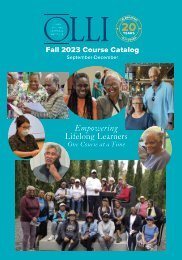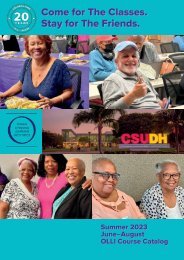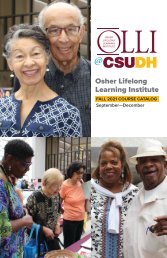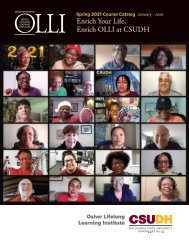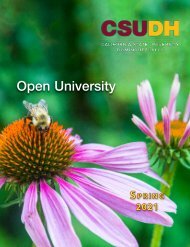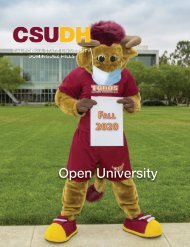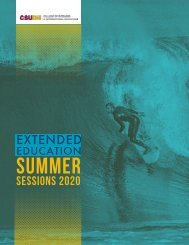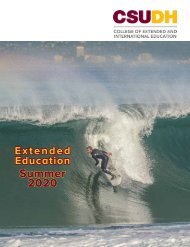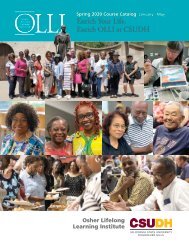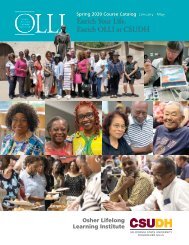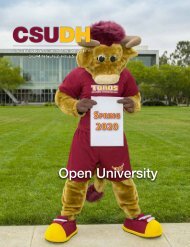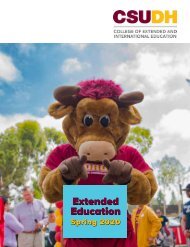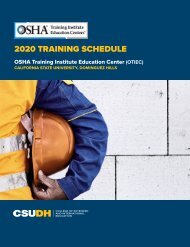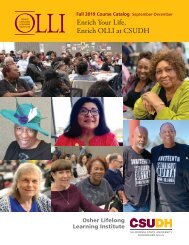Spring 2019 OLLI Catalog
The Osher Lifelong Learning at California State University Dominguez Hills is a program of educational, cultural, and social opportunities for retired and semi-retired individuals age 50 and above. Members experience taking courses in a relaxed atmosphere for the pure pleasure of learning.
The Osher Lifelong Learning at California State University Dominguez Hills is a program of educational, cultural, and social opportunities for retired and semi-retired individuals age 50 and above. Members experience taking courses in a relaxed atmosphere for the pure pleasure of learning.
Create successful ePaper yourself
Turn your PDF publications into a flip-book with our unique Google optimized e-Paper software.
BLACK HISTORY MONTH<br />
Facilitators: Eula Slater and<br />
Norris Curl, <strong>OLLI</strong> Members<br />
3 Mondays<br />
February 4, 18, 25<br />
10:00am – 12:00pm<br />
Extended Education Building,<br />
EE-1213 (Auditorium)<br />
Fee: Free to <strong>OLLI</strong> Members<br />
and Open to the Public<br />
<strong>OLLI</strong> Members Only<br />
NLLL 155 Section 01<br />
Course No. 23928<br />
Non-<strong>OLLI</strong> Members Only<br />
NLLL 155 Section 02<br />
Course No. 23929<br />
Presenter: Colette Haywood, is an<br />
American publisher, business woman,<br />
community activist, and arts patron.<br />
She is the editor of the Atlanta community<br />
Newspaper Historic Westside<br />
News, and executive producer of “The<br />
Soul of Atlanta,” a documentary that<br />
explores the unique history of the<br />
Atlanta University Consortium (AUC).<br />
Monday, February 11<br />
10:00am - 12:00pm<br />
Extended Education Building,<br />
EE-1213 (Auditorium)<br />
Fee: Free to <strong>OLLI</strong> Members<br />
and Open to the Public<br />
<strong>OLLI</strong> Members Only<br />
NLLL 001 Section 01<br />
Course No. 23879<br />
Non-<strong>OLLI</strong> Members Only<br />
NLLL 001 Section 02<br />
Course No. 23880<br />
Discussion Group —<br />
The Book of Negroes<br />
In conjunction with Black History Month <strong>OLLI</strong><br />
will present The Book of Negros a series based<br />
on a Lawrence Hill’s novel of the same name.<br />
The Canadian Broadcasting Corporation (CBC)<br />
Television series is an exploration of slavery<br />
in North America through the eyes and<br />
experiences of Aminata Diallo.<br />
Aminata is the much-loved daughter of a midwife mother, with<br />
whom she “catches” babies, and artisan father, who has taught<br />
her to read the Koran and write Arabic. Kidnaped by enslavers as<br />
a young girl, she endured a forced march in shackles to the coast,<br />
branding with a hot iron, a whipping so severe it opens her back,<br />
the middle passage across the Atlantic, and her sale as chattel to<br />
an indigo plantation owner. These trails mark the beginning of her<br />
story and harden her determination to find her way home.<br />
An <strong>OLLI</strong> Distance Lifelong Learning Event<br />
Why Historically Black Colleges and<br />
Universities Matter in Today’s America<br />
NEW!<br />
NEW!<br />
Arguably, the two most<br />
important black spaces in<br />
America are Historically Black<br />
Colleges and Universities<br />
(HBCUs) and the Black Church.<br />
According to Michael Lomax,<br />
Ph.D., President and CEO of<br />
UNCF-the United Negro College Fund, “During long dark days<br />
of Jim Crow segregation, HBCUs educated the lawyers, doctors,<br />
teachers and ministers who built black communities across the<br />
South. They educated the pioneering activists who built the civil<br />
rights movement that broke Jim Crow’s back to meet those needs.”<br />
While some institutions are experiencing great growth in securing<br />
diverse funding, student enrollment, and program offerings, others<br />
are struggling to remain open. In an era when more African<br />
American students are attending private white institutions, are<br />
HBCUs still necessary? To what extent do HBCU controversies—loss<br />
of accreditation, financial mismanagement, low enrollment—do<br />
irreparable damage? Why is the contribution HBCUs make to the<br />
American economy so little appreciated?<br />
20 OSHER LIFELONG LEARNING INSTITUTE @ CSU DOMINGUEZ HILLS




